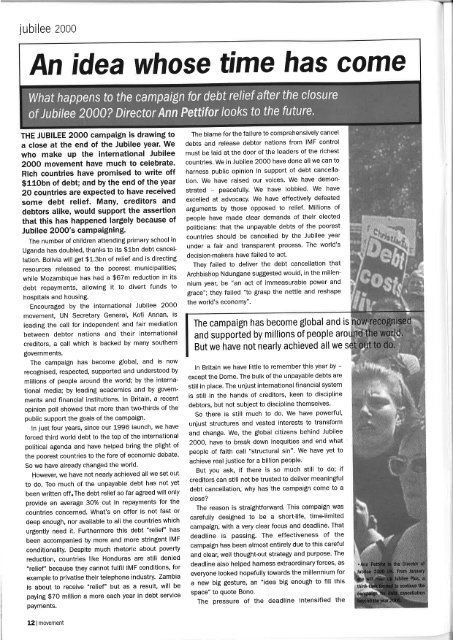Movement 107
You also want an ePaper? Increase the reach of your titles
YUMPU automatically turns print PDFs into web optimized ePapers that Google loves.
jubilee 2000<br />
An idea whose fime has come<br />
THE JUBILEE 2000 campaign is drawing to<br />
a close at the end of the Jubilee year. We<br />
who make up the international Jubilee<br />
200O movement have much to celebrate.<br />
Rich countries have promised to write off<br />
$11obn of debt; and by the end of the year<br />
20 countries are expected to have received<br />
some debt relief. Many, creditors and<br />
debtors alike, would support the assertion<br />
that this has happened largely because of<br />
Jubilee 200O's camPai$nin$'<br />
The number of children attending primary school in<br />
Uganda has doubled, thanks to its $1bn debt cancellation.<br />
Bolivia will get $1.3bn of relief and is directing<br />
resources released to the poorest municipalities;<br />
while Mozambique has had a $67m reduction in its<br />
debt repayments, allowing it to divert funds to<br />
hospitals and housing.<br />
Encouraged by the international Jubilee 20OO<br />
movement, UN Secretary General, Kofi Annan' is<br />
leading the call for independent and fair mediation<br />
between debtor nations and their international<br />
creditors, a call which is backed by many southern<br />
governments.<br />
The campaign has become global' and is now<br />
recognised, respected, supported and understood by<br />
millions of people around the world; by the international<br />
media; by leading academics and by governments<br />
and financial institutions. ln Britain' a recent<br />
opinion poll showed that more than twcthirds of the<br />
public support the goals of the campaign'<br />
ln just four years, since our 1996 launch, we have<br />
forced third world debt to the top of the international<br />
political agenda and have helped bring the plight of<br />
the poorest countries to the fore of economic debate'<br />
So we have already changed the world.<br />
However, we have not nearly achieved all we set out<br />
to do. Too much of the unpayable debt has not yet<br />
been written off.The debt relief so far agreed will only<br />
provide an average 30% cut in repayments for the<br />
countries concerned. What's on offer is not fast or<br />
deep enough, nor available to all the countries which<br />
urgently need it. Furthermore this debt "relief" has<br />
been accompanied by more and more stringent IMF<br />
conditionality. Despite much rhetoric about poverty<br />
reduction, countries like Honduras are still denied<br />
"relief" because they cannot fulfil IMF conditions, for<br />
example to privatise their telephone industry. Zambia<br />
is about to receive "relief" but as a result, will be<br />
paying $70 million a more each year in debt service<br />
payments.<br />
The blame for the failure to comprehensively cancel<br />
debts and release debtor nations from IMF control<br />
must be laid at the door of the leaders of the richest<br />
countries. We in Jubilee 2000 have done all we can to<br />
harness public opinion in support of debt cancellation.<br />
We have raised our voices. We have demonstrated<br />
- peacefully. We have lobbied. We have<br />
excelled at advocacy. We have effectively defeated<br />
arguments by those opposed to relief. Millions of<br />
people have made clear demands of their elected<br />
politicians: that the unpayable debts of the poorest<br />
countries should be cancelled by the Jubilee year<br />
under a fair and transparent process. The world's<br />
decision-makers have failed to act.<br />
They failed to deliver the debt cancellation that<br />
Archbishop Ndungane suggested would, in the millennium<br />
year, be "an act of immeasurable power and<br />
grace"; they failed "to grasp the nettle and reshape<br />
the world's economy".<br />
The campaign has become global and is<br />
and supported by millions of people aro<br />
But we have not nearly achieved all we<br />
ln Britain we have little to remember this year by -<br />
except the Dome. The bulk of the unpayable debts are<br />
still in place. The unjust international financial system<br />
is still in the hands of creditors, keen to discipline<br />
debtors, but not subject to discipline themselves.<br />
So there is still much to do. We have powerful,<br />
unjust structures and vested interests to transform<br />
and change. We, the global citizens behind Jubilee<br />
2000, have to break down inequities and end what<br />
people of faith call "structural sin"' We have yet to<br />
achieve real justice for a billion people.<br />
But you ask, if there is so much still to do; if<br />
creditors can still not be trusted to deliver meaningful<br />
debt cancellation, why has the campaign come to a<br />
close?<br />
The reason is straightforward. This campaign was<br />
carefully designed to be a shortlife, timelimited<br />
campaign, with a very clear focus and deadline' That<br />
deadline is passin$. The effectiveness of the<br />
campaign has been almost entirely due to this careful<br />
and clear, well thoughtout strategy and purpose. The<br />
deadline also helped harness extraordinaryforces, as<br />
everyone looked hopefully towards the millennium for<br />
a new big gesture, an "idea big enough to fill this<br />
space" to quote Bono.<br />
The pressure of the deadline intensified the<br />
12 lmovement

















